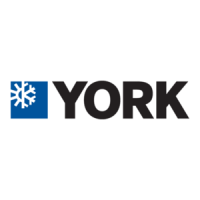JOHNSON CONTROLS
38
FORM 102.20-OM2
ISSUE DATE: 6/01/2015
SECTION 2 - START-UP AND OPERATION
9. Checktheue(stack)combustiontemperatureat
the ID blower housing test port. Make sure the test
probe is inserted halfway into the ID inlet tube as
shown in Figure 33 on page 38. Compare the
results to the Burner Test Report.
10. The ignition transformer is intermittent. Pilot
continues to burn after ignition transformer is de-
energized.
11. Using the signal generator, cycle the burner to
check capacity modulation. Observe valve/damp-
er actuator operation as shown in Figure 34 on
page 38.
12. Using the standard operating controls, cycle the
burner several times to assure proper sequencing
ofstart-up,ring,andcapacitymodulation,plus
operation of all safety and monitoring controls.
13. Test the 180°F high temperature safety by running
the burner with the airow off or diverted. The
burner will shut down at 180°F. Turn the AHU on
as quickly as possible to remove the heat from the
heat exchanger.
14. Testtheburnerefciencylast.Theburnershould
berunningathighreratefor30minutesbefore
efciencytestingisdone.
15. Efciencyathighreispre-determined,butmay
becheckedbyuegasanalysisattheentranceto
theIDBlowerHousingTestPort.Athighre,the
CO
2
should be between 8-1/2% and 10%; the 0
2
should be between 7-1/2% and 4%. With these
ranges, efciency is 80% plus or minus 2% as
shown in Figure 33 on page 38.
16. Contact the contractor, facilities manager or cus-
tomer to inform them that the start-up was com-
pleted successfully.
17. In the unlikely event that adjustment is required;
itisdoneathighreand mustNOT retard low
relight-off.
Do not change the set up of factory pre-
set air inlet dampers on the power ame
burner.
18. Direct any questions to the Johnson Controls
FieldServiceOfceorProductTechnicalSupport
before contacting the burner manufacturer.
19. Whenoperatedat lowre forextendedperiods,
more condensate is generated and with it deposits
of solids in the condensate drainage system.
20. Provide the ability to prime the trap. During initial
and seasonal start up, trap inspection and priming
is required. Condensate in the trap will evaporate
during long periods of non-use.
21. Trap and drainage system should be cleaned an-
nually.
FIGURE 32 - DRAFT OVER FIRE TEST PORT
LD12908
FIGURE 33 - FLUE COMBUSTION TEMPERATURE
AND EFFICIENCY TEST PORT- ID BLOWER
LD12906
FIGURE 34 - DAMPER ACTUATOR
LD12909

